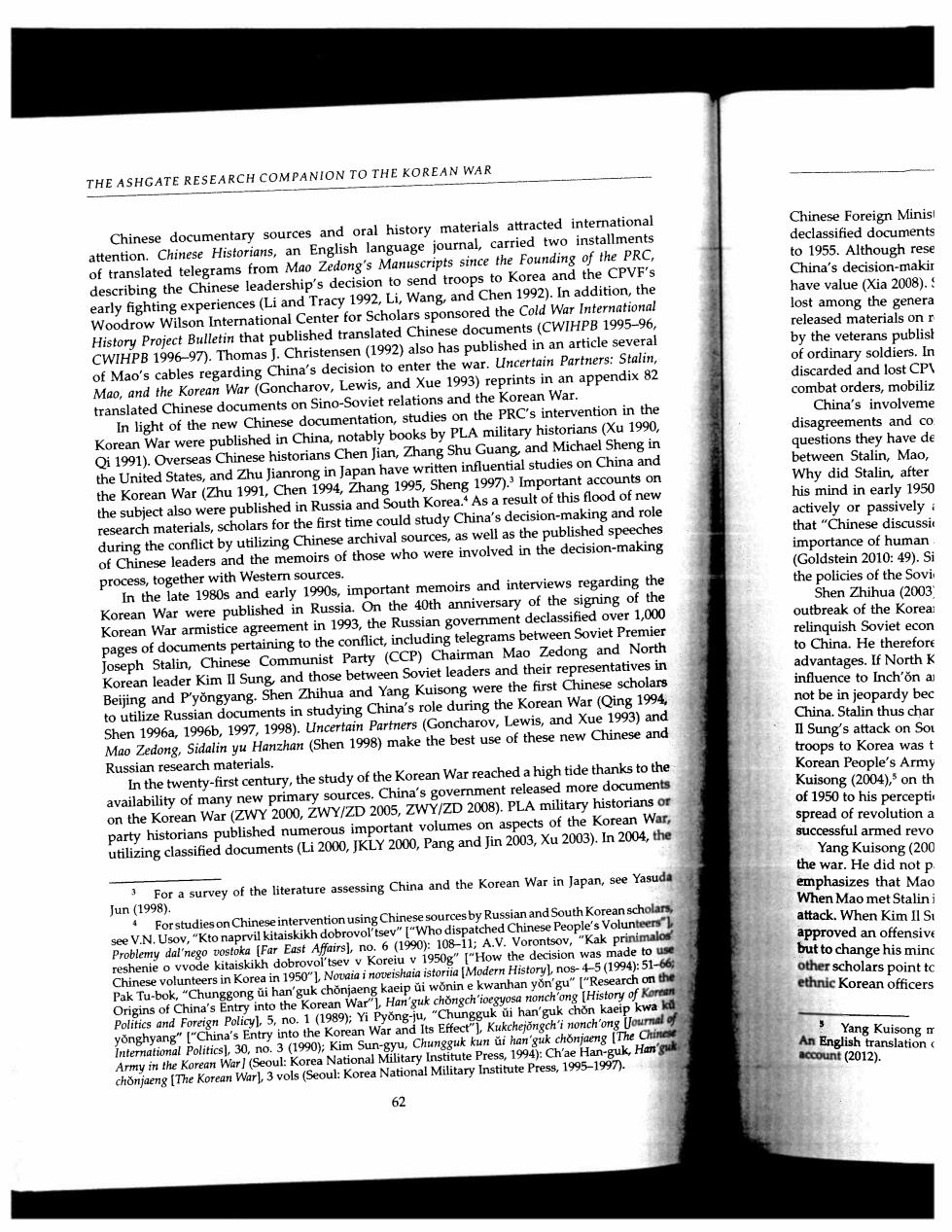正在加载图片...

THE ASHGATE RESEARCH COMPANION TO THE KOREAN WAR Chinese documentary sources and oral history materials attracted international Chinese Foreign Minis! attention.Chinese Historians,an English language journal,carried two installments declassified documents of translated telegrams from Mao Zedong's Manuscripts since the Founding of the PRC, to 1955.Although rese describing the Chinese leadership's decision to send troops to Korea and the CPVF's China's decision-makir early fighting experiences(Li and Tracy 1992,Li,Wang,and Chen 1992).In addition,the have value (Xia 2008). Woodrow Wilson International Center for Scholars sponsored the Cold War International lost among the genera History Project Bulletin that published translated Chinese documents(CWIHPB 1995-96, released materials on r CWIHPB 1996-97).Thomas J.Christensen(1992)also has published in an article several by the veterans publish of Mao's cables regarding China's decision to enter the war.Uncertain Partners:Stalin, of ordinary soldiers.In Mao,and the Korean War(Goncharov,Lewis,and Xue 1993)reprints in an appendix 82 discarded and lost CP\ translated Chinese documents on Sino-Soviet relations and the Korean War. combat orders,mobiliz In light of the new Chinese documentation,studies on the PRC's intervention in the China's involveme Korean War were published in China,notably books by PLA military historians(Xu 1990, disagreements and co Qi 1991).Overseas Chinese historians Chen Jian,Zhang Shu Guang,and Michael Sheng in questions they have de the United States,and Zhu Jianrong in Japan have written influential studies on China and between Stalin,Mao, the Korean War(Zhu 1991,Chen 1994,Zhang 1995,Sheng 1997).3 Important accounts on Why did Stalin,after the subject also were published in Russia and South Korea.As a result of this flood of new his mind in early 1950 research materials,scholars for the first time could study China's decision-making and role actively or passively a during the conflict by utilizing Chinese archival sources,as well as the published speeches that "Chinese discussie of Chinese leaders and the memoirs of those who were involved in the decision-making importance of human (Goldstein 2010:49).Si process,together with Western sources. In the late 1980s and early 1990s,important memoirs and interviews regarding the the policies of the Sovi Korean War were published in Russia.On the 40th anniversary of the signing of the Shen Zhihua (2003 Korean War armistice agreement in 1993,the Russian government declassified over 1,000 outbreak of the Korea pages of documents pertaining to the conflict,including telegrams between Soviet Premier relinquish Soviet econ Joseph Stalin,Chinese Communist Party (CCP)Chairman Mao Zedong and North to China.He therefore Korean leader Kim II Sung,and those between Soviet leaders and their representatives in advantages.If North K Beijing and P'yongyang.Shen Zhihua and Yang Kuisong were the first Chinese scholars influence to Inch'on a to utilize Russian documents in studying China's role during the Korean War(Qing 1994, not be in jeopardy bec Shen 1996a,1996b,1997,1998).Uncertain Partners(Goncharov,Lewis,and Xue 1993)and China.Stalin thus char Mao Zedong,Sidalin yu Hanzhan(Shen 1998)make the best use of these new Chinese and ⅡSung's attack on Sou troops to Korea was t Russian research materials. In the twenty-first century,the study of the Korean War reached a high tide thanks to the Korean People's Army availability of many new primary sources.China's government released more documents Kuisong (2004),s on th on the Korean War(ZWY 2000,ZWY/ZD 2005,ZWY/ZD 2008).PLA military historians or of 1950 to his percepti party historians published numerous important volumes on aspects of the Korean War, spread of revolution a utilizing classified documents (Li 2000,JKLY 2000,Pang and Jin 2003,Xu 2003).In 2004,the successful armed revo Yang Kuisong(200 the war.He did not p 3 For a survey of the literature assessing China and the Korean War in Japan,see Yasuda emphasizes that Mao When Mao met Stalin i For studies on Chinese intervention using Chinese sources by Russian and South Korean scholars, Jun(1998). attack.When Kim Il S see V.N.Usov,"Kto naprvil kitaiskikh dobrovol'tsev"["Who dispatched Chinese People's Volunteers" Problemy dal'nego vostoka [Far East Affairs],no.6(1990):108-11;A.V.Vorontsov,"Kak prinimalos approved an offensive reshenie o vvode kitaiskikh dobrovol'tsev v Koreiu v 1950g"["How the decision was made to use but to change his minc Chinese volunteers in Korea in 1950"1Novaia inoveishaia istoriia[Modern Historyl,nos-4-5(1994):51-6 other scholars point tc Pak Tu-bok,"Chunggong ui han'guk chonjaeng kaeip ui wonin e kwanhan yon'gu"["Research on the ethnic Korean officers Origins of China's Entry into the Korean War"Han'guk chongch'ioegyosa nonch'ong [History of Kore Politics and Foreign Policyl.5,no.1 (1989);Yi Pyong-ju,"Chungguk ui han'guk chon kaeip kwa k yonghyang"["China's Entry into the Korean War and Its Effect"]Kukchejongch'i nonch'ong Uoural International Politics],30,no.3(1990):Kim Sun-gyu,Chungguk kuni han'guk chonjaeng [The Chinese 》Yang Kuisong An English translation c Army in the Korean War](Seoul:Korea National Military Institute Press,1994):Ch'ae Han-guk,Han'guk account(2012). chonjaeng [The Korean Warl,3 vols(Seoul:Korea National Military Institute Press,1995-1997). 62